#there’s multiple references to other parts of the Trojan war/other myths and also some references to other media lol
Explore tagged Tumblr posts
Text
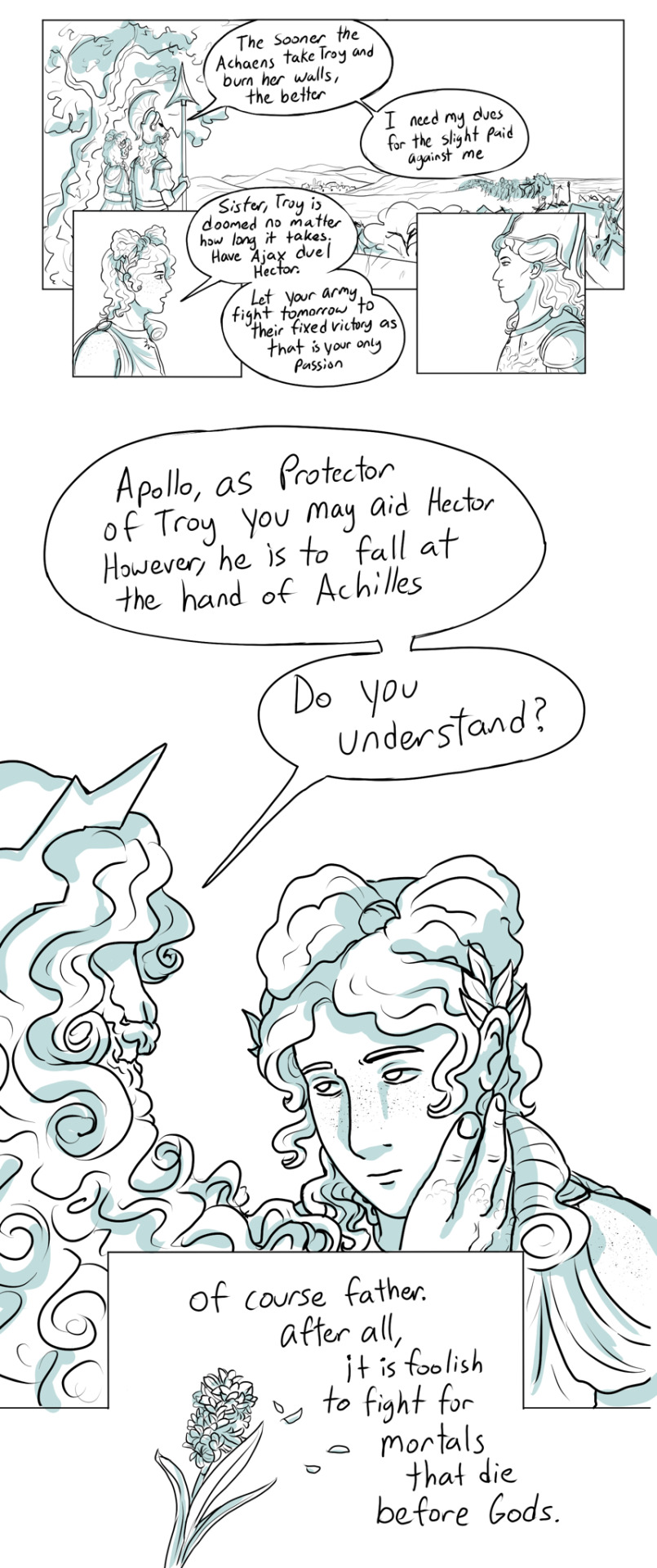
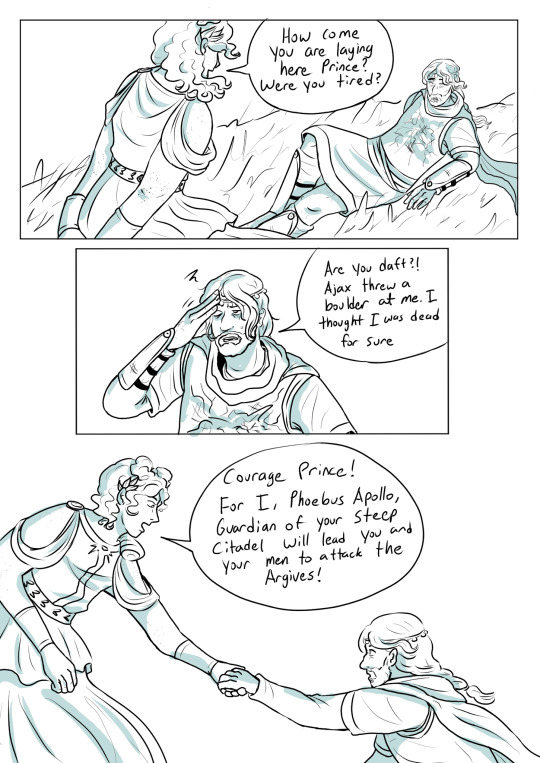
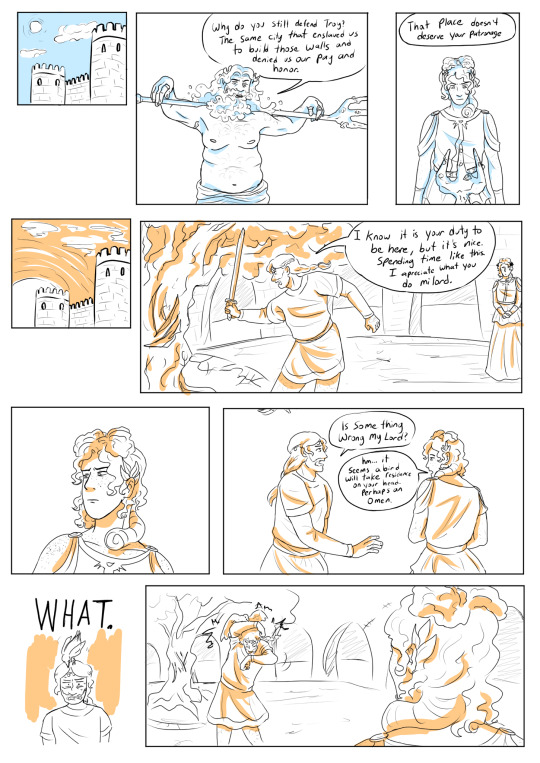


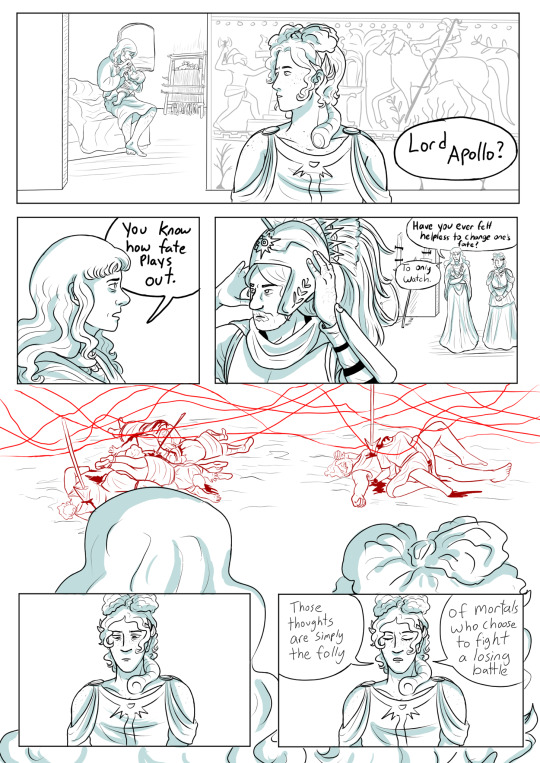

This was my final project for a Mythological Receptions and Adaptations course where I adapted the Apollo sections of the Iliad to explore his POV and feelings during it
I wanted to focus on the struggle of not being able to change the outcome of something you know will happen and also his bond with Hector of Troy
#I nicknamed this ‘Apollo is a mess that loves to contradict himself’#there’s multiple references to other parts of the Trojan war/other myths and also some references to other media lol#uhhh yea#Apollo#hector#hector of troy#Hektor of Troy#Andromache#Zeus#Poseidon#Athena#astyanax#Achilles#the Iliad#tagamemnon#Greek myths#greek mythology#Misty arts
278 notes
·
View notes
Text
Herbarium: Apple
Witches, it is almost apple season and as such, I have come to throw a herbarium post your way about the magical and medicinal uses of the glorious, tasty apple!

Gender: Feminine
Planet: Venus
Element: Water
Powers: Abundance, Healing, Immortality, Love
Magical Uses and History: Sometimes referred to as the Witch's Fruit because its seeds resemble a 5-pointed star, apple is ripe with history and folklore. The history of the magical and ritual uses of the apple is lengthy, dating back thousands of years. As early as 8,000 B.C., evidence from the Nile, Tigris, Euphrates, Indus, and Yellow River valleys suggests the apple was highly valued and cultivated crop. Furthermore, the apple plays a prominent role in myths from around the world, often being associated with magic, immortality, death, knowledge, and love. It has been called the Fruit of the Gods, Fruit of the Underworld, and the Silver Bough. In fact, the name Avalon is likely derived from the old Irish word meaning "the place of apples."
In an old Scandinavian Saga, Edda, Idunn (or Iduna) kept apples that were eaten by the Gods to ensure eternal youth. A similar myth appears in Greek folklore where Hesperides guards the apple trees that provide the same gift of youth and immortality to those who eat them. Apples also played a prominent role in Diana's Festival on August 13 in Greece where apples were prepared still on their boughs as part of the ritual meal. And while the Bible never explicitly states the tree of knowledge is an apple tree, it has long been believed to be so. In Celtic mythology, a branch of apple with buds, flowers, and ripened fruit, known as the Silver Bough, was thought to be a magical charm that would allow the bearer to walk between the land of the Gods and the Underworld freely. Apples are also mentioned in an old English ballad, Thomays the Rymour, where the Fairy Queen warns Thomas against eating any of the apples during the feast for to do so would mean he would not be able to walk among the living again. Finally, it is believed the Trojan war was started when the Goddess Eris threw an apple into the midst of a group of goddesses, claiming it was for "the fairest."
Due to its association with death and the Underworld, apples often adorn Samhain altars or are buried as offerings to the Dead so they may have something to eat during the long winter months ahead. Strong cider brewed from apple is sometimes referred to as Witch's Brew and placed on altars or poured on the ground for the same reasons. The wassailing tradition is still maintained in parts of England, especially Somerset, where on the Twelfth Night (Yule) cakes and cider are offered to the trees as libations for the spirits. Guns are often shot and pans banged together afterward to drive away evil and negative spirits.
The number of love spells using the apple is countless. Apple blossoms are added to love sachets, incense, and brews to increase spell potency and bring the caster love. Furthermore, an apple can be held in your hand until warm then given to your love interest. If they eat the apple, then they love you too. The most famous apple love spell, however, was popular among unmarried women across Europe. Simply peel an apple in one piece and throw the peel over your shoulder. The letter it forms is said to be the first letter of your future husband. Margaret Atwood brings light to this tradition in her book Alias, Grace where Mary and Grace try to figure out their future husbands. Mary is unable to peel multiple apples in a single go, foretelling her death in the near future. Other love spells include counting the seeds; even for marriage soon to come, odd for no marriage in the foreseeable future, a cut seed foretelling a tumultuous marriage, and two seeds cut foretelling widowhood. To ensure fidelity, cut an apple in half and have your lover eat one half while you eat the other.
Apples are also used in fertility spells. Barren women in Kirghizstan are said to roll around under an apple tree in order to become pregnant. In some parts of Europe, apple trees are planted at the birth of a son as an indicator of his health and virality. Furthermore, the apple is viewed as a life-giving fruit among the Celts and Welsh. Due to its potency of the drink created from fermented apples, they may have been linked to orgiastic rites.
The apple also has a long history of healing uses. The old Welsh proverb, "An apple a day keeps the doctor away" rings with truth, as the apple contains properties that reduce fever, thus keeping the doctor away. An apple can also be cut into three pieces and rubbed on the affected area then buried during the waning of the Moon to banish illnesses. Gardeners would pour apple cider onto freshly-tilled soil to breathe life back into it prior to planting.
Apples can be used in a number of spells including:
Divination
Love Spells
Healing Magic
Prosperity Magic
Please note there are hundreds of other magical uses not mentioned here. The list is too lengthy to include in one post.
Medicinal Uses: Apples are commonly used to reduce fever (and historically scurvy) due to high levels of antioxidants and vitamin C. Apple cider vinegar is also used to treat fevers and sunburns. Early research also suggests eating apples may reduce your chances of cancer, especially of the esophagus and larynx, diabetes, and lung cancer. Research also suggests eating three apples a day increases weight loss.
Preparation and Dosage: Internally- If running a fever, eat an apple, drink apple juice, or eat applesauce immediately to boost the immune system and reduce the fever. Apple cider vinegar can also be taken internally to reduce a fever. Simply mix 2 tsp of apple cider vinegar with 1 tsp honey in a glass of warm water and drink 2-3 times a day until fever breaks. Externally- To reduce fever, place a towel soaked in a 1:2 part mixture of apple cider vinegar and water on your forehead or abdomen. Change towels after they have absorbed your body heat until fever eases. For a bath, mix 1 cup apple cider vinegar in a warm bathtub and stay in the water for 5 to 10 minutes. To treat sunburns, spray the affected area with a 1:1 mixture of apple cider vinegar and water, dabbed a vinegar soaked washcloth on the affected area, or take a cool bath mixed with 1 cup of apple cider vinegar.
Want to print a copy of this for your Book of Shadows? Click below for your free copy! Please visit here to download and print your own copy.

#hedgewitch#hedge witch#herbal#herb#apple#magical properties of apple#herbarium#magical herbs#wicca#wiccan#witchcraft#pagan#herbal remedy
267 notes
·
View notes
Text
The Dan Scrolls (for Episode 05 of XWB, Season 1.4 of XWP) by Dan Cassino
There are a couple of interesting things about this episode from a mythological standpoint, and what amounts to some very clever work with Pandora, reinforcing my notion that this show is way smarter than it gets clever for.
The main point of interest is the setting of the episode: when it picks up, our heroines are by a riverbank outside of Lerna. The waters of Lerna are famous: according to legend, the region didn’t have any waters until Poseidon rescued a princess (Amymone) from being raped by a satyr. In what was apparently an effort to woo her, he created the springs, which apparently worked, as she bore him a son, the hero Naupilus (not the one who was involved in the Trojan War).
The mystical origins of the waters of Lerna led to all sorts of shenanigans. The waters were reputed to be so deep that no one could reach the bottom. It was so deep, in fact, that there was a portal to the underworld at the bottom. Of course, no portal to the underworld is unguarded, and this one was guarded by the Lernaen Hydra (of “cut one head off and two grow in its place” fame) that was eventually killed by Hercules (though I don’t know if Herc already killed it in his show).
To appease the Hydra, so it wouldn’t come and kill the locals, Autolycos’ twin half-brother (I know) started a cult dedicated to protecting the gate, generally by making sacrifices to the hydra, which consisted of sending livestock into the lake, where they could sink to the bottom and be consumed by the monster. Which means that they had an opportunity for an in continuity Bruce Campbell double role, and they missed it, which is unforgivable. There were also, apparently, more sinister activities being carried out by the cult as sacrifices to Dionysus, who was thought to have descended to Hades through the Lernaen gate. Among these was thought to be human sacrifice.
It may seem weird that there’s a medieval style castle in the middle of the Peloponnese, but that’s actually on point. Lerna was the site of one of the most impressive fortresses of antiquity, called “The House of Tiles.” Dating from the 23 rd Century BCE (early bronze age) it had multiple floors, staircases, and, critically, a terra-cotta tile roof: something that didn’t become common in Greek architecture until 1600 years later. This would have made it resistant to being set on fire, which was one of the major ways you took down enemy fortifications in bronze age warfare.
I would suggest that the ur-plot for this episode consists of King Gregor’s advisor being part of the Lernean mystery cult, and secretly trying to sacrifice the baby to the monster in the lake and/or Dionysus. Doing so would guarantee the safety of the community for a time; it would also be something that he would need to keep from the ruler, who wouldn’t have been part of the cult. A failure to sacrifice the child would have meant disaster for the community, and a very nice moral dilemma for our heroines, which is basically the same one they wind up dealing with.
So, what’s Pandora doing in there? Well, because of its connection with the Hydra, Dionysus and the underworld, Lerna was often referred to as a major source of evil in the world (“Lerna Malorum Omnium”). Given that Pandora was responsible for releasing evil into the world, and did so from the underworld (her name means “she who sends up gifts,” with the “up” implying a chthonic connection) it’s actually super-clever that they would situate her at Lerna, a known site of evil emanations.
It’s also clever to pair Pandora with a baby. It’s common to think of Pandora as being the woman who released evil into the world, but the myth is actually way more problematic than that. Before Pandora, all people were men, and they lived forever, and they ate fruit all the time. Then Hephaestus made Pandora, and she opened her jar, and released all of the evils – including mortality and child birth – into the world. Since then, people have lived and reproduced and died, and had to eat things other than fruit. She’s an Eve figure, responsible for the existence of all babies and children.
3 notes
·
View notes
Text
Athena in the Homeric Epics: Rediscovering Her Complexity

Bas-relief sculpture of the Roman goddess Minerva recovered from the ruins of Herculaneum (Image in the public domain)
For the purpose of this project, I focused on Athena as she is represented in the Homeric epics and related tales. Although Athena’s worship began well before that time and has intriguing possible connections to prehistoric goddess worship, and also continued into the Roman period with multiple synchronisations, I wanted to reexamine the character of the goddess as captured in the older Greek myths. Greek and Roman mythology is commonly taught in schools, including allusions to it as an original source of Western culture, and the Homeric epics in particular are often held up as some of the earliest extant literature. The passing familiarity that results from this kind of exposure can give an impression that Athena is a warrior goddess, or a goddess of wisdom, although most people have trouble remembering exactly the role she played in the Iliad; the myth most commonly associated with Athena is the story of Arachne, which is one of the few where the goddess alone takes centre stage. The story of Arachne emphasises the goddess’ patronage of weaving as a useful household art, but the short vignette hardly captures the dynamic vitality of Athena’s character as she appears throughout the earlier epics. By comprehensively reviewing her appearances in the Homeric epics, this project strives to rediscover the complex nature of Athena in the Archaic period and to understand how that persona of the goddess might be approached in the context of contemporary women’s spirituality.
In the Homeric epics, Athena’s primary role is as a warrior: she is commonly referred to as “heaven’s triumphant maid,” “the martial maid,” or as the “all-conquering.” Her other most frequent epithet is “blue-eyed maid,” which may also be translated as “shining-eyed” or “gleaming-eyed.” In Homer’s tales, references to her mastery or patronage of weaving are only side-lights. In a couple of instances, she appears in human form as “a fair virgin in her beauty’s bloom, / Skill’d in the illustrious labours of the loom,” and it is specifically mentioned that when Hera wanted to impress Zeus with her beauty, she wore a robe woven by Athena, but no specifics of this weaving are mentioned. The vast majority of Athena’s appearances refer to her wearing armour or being in disguise.



Ancient Coins with Images of Athena ( © Marie-Lan Nguyen / Wikimedia Commons)
Her varied appearances are the first example of Athena’s complexity. She does not conform to simple ideas of gender for either the ancient Greeks or for us. Her role in the Iliad, in fact, is due in part to this masculine attitude: she was one of the three goddesses who claimed the golden Apple of Eris (Discord). Paris, judging between the three, refused Athena’s offered bribe of wisdom and skill in war. Instead, he judged in favour of Aphrodite, accepting from her the love of Helen, the most beautiful mortal woman. Aphrodite approached Paris using the wiles of beauty and the promise of love to win him over; Athena, and Hera, who also lost, approached him almost as an equal, trying to win him over with offers in the masculine realms of rulership and war. Afterwards, Hera and Athena had a solid alliance because of their loss, and Athena often acts on Hera’s behalf.
Interestingly, Athena also acts in Zeus’ name and even uses his symbols: the aegis was originally his, although it appears more often as part of Athena’s equipage; when she takes the form of a bird, it is as an eagle, Zeus’ bird, not an owl; and with his permission, she even wields the thunder and lightning that are Zeus’ identifying characteristics. Thus Athena’s outward signs and symbols are almost universally masculine. In fact, the way she crosses gender boundaries almost seems to deprive her of a gender of her own: she is not described as virgin solely because she had “autonomy and independence.” She is virgin in the literal sense as well; no myth depicts her having a lover, human or immortal, or even to be interested in one.
Her status as transgressing or simply disregarding gender boundaries does grant her unusual freedoms, though, and makes her the ideal intermediary between the goddesses and the gods. Athena’s work on Hera’s errands and her own often involves interacting with Ares or Apollo, or even Zeus. Ares, when fully engaged in his martial bloodlust, seems almost unapproachable, especially by one of the unarmoured goddesses, but Athena faces him without fear. In contrast, although she is approached by other goddesses, Athena is only invoked by a woman in the Homeric epics on behalf of a man. Hecuba, queen of Troy, petitions Athena once, when advised to do so by her warrior son, and pleads for Athena’s mercy on the city, but Athena refuses to hear her. Later, Penelope petitions Athena to watch over Telemachus, the son of Athena’s favourite hero, Odysseus. This petition is successful, but Athena was already helping Telemachus, and did so for Odysseus’ sake, not because of Penelope’s petition. When Penelope bemoans her own situation or asks for help from a goddess, she turns to Artemis, not Athena.
Given these interactions, it is perhaps unsurprising that in her relationship with her devotee, Odysseus, Athena acts more as a comrade or adviser than as a mother. Even in combat and when protecting his life, Athena’s assistance is not described in the way other goddesses’ supervision of their charges is; she is much more likely to take form and engage in combat alongside Odysseus, or to act on his behalf, than to coddle or nurture him. When she does engage in combat, Athena’s approach to fighting is as complex as her gender presentation.
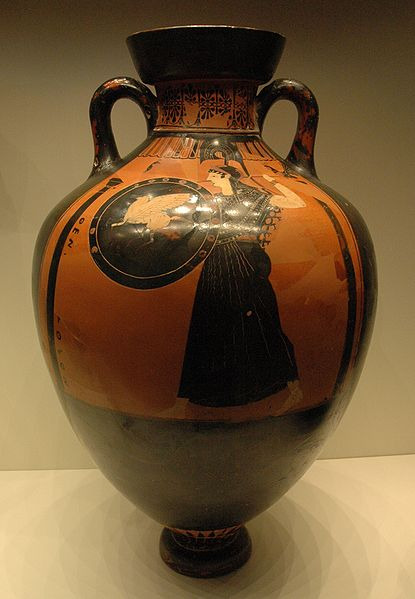

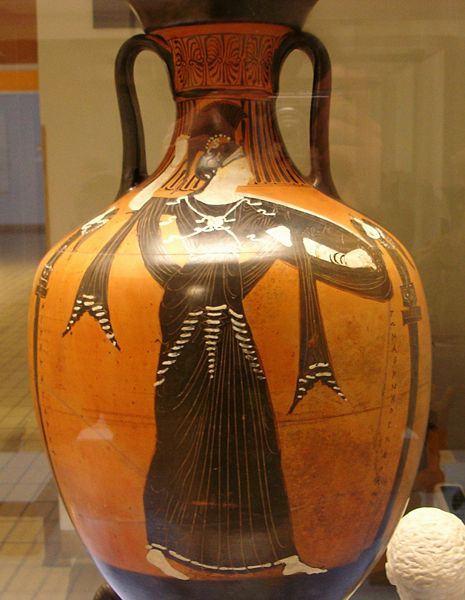
Amphorae with Images of Athena (Left photo: Creative Commons Attribution-Share Alike 2.0 Generic license.) (Center and right photos: Images in the public domain)
In one dramatic scene, she appears on the battlefield to face down her brother Ares, and after he insults her and implies she is merely causing trouble, she picks up a rock and knocks him unconscious with a single blow. In another violent scene, at the end of the Odyssey, she inflames an already tense situation and engineers a complete massacre. But almost immediately thereafter, she overrides Odysseus’ fury and enforces a peace on both sides once her sense of right and wrong has been satisfied. In contrast to Ares’ bloodlust in battle, she seems constantly focused on a purpose; victory in combat is only a means toward an end for Athena.
The greatest single example of her approach to combat is the Trojan horse, the epitome of cleverness and trickery. She inspires the craftsman with its design.After this stratagem succeeds, though, the triumphant Greeks fail to pay her sufficient homage, and in anger she wrecks several ships as they begin their journey home. This episode exemplifies how Athena’s pragmatic approach to combat applies her wisdom in order to satisfy her overriding ideas of justice.
Neither her wisdom nor her justice are at all what many contemporary readers might expect, especially from a goddess. Although she is often called the goddess of wisdom, Athena’s expertise might be better described as cunning. She appreciates trickery and does not shy from it herself, in matters as large as the Trojan horse and as small as appearing in the form of a mortal when addressing those who call on her. Athena disguises herself as a good friend of the person to whom she speaks, both to lead Hector to his death and to answer Penelope’s appeal. Odysseus himself is best known for his cunning and wit, not his abstract knowledge or impartial wisdom, and he frequently relies on Athena’s ability to change his outward appearance. Just as Athena spends most of her time carrying a masculine appearance and doing things that are unexpected of a goddess, she seems to value the same gift for inventiveness in her followers.
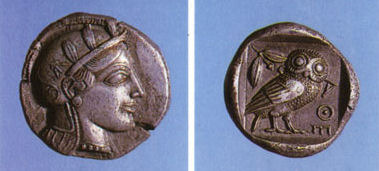
Athenian Tetradrachm (Image in the public domain)
Her unique approach to morality is best summed up in a tale that is scattered in fragments throughout the Homeric epics. After Agamemnon, the leader of the Greeks, returned home, he was killed by his wife and the lover she has taken while he was gone. His son, Orestes, avenges his father by killing his mother and her lover. For the terrible act of killing his mother, Orestes is pursued by the Furies who seek vengeance, but he appeals to Athena. She establishes a law court on the Areopagitica to judge his case, and when the court’s vote is tied, she casts the final vote, finding Orestes not guilty. One telling gives her explanation as: “I was not borne by a mother. I, a virgin, sprang from the head of Zeus, my father, and I protect the rights of father and son against those of the mother. And so I shall not take the part of the woman who slew her husband to please her wicked lover.”
The overall image of Athena that emerges is composed of a mass of contradictions: she is a virgin who appears and acts in masculine ways, an extremely powerful warrior who disdains fighting for fighting’s sake, and a patroness of cunning who renders judgement based on her own sense of justice, being willing to face down the Furies and deny them vengeance in the process. She is, most of all, a figure of extreme practicality, willing to use appearances to get what she wants, but cutting through what she regards as irrelevant to pursue her own goals with single-minded focus.
Although the Homeric epics do not depict women calling on Athena for their own purposes, she is a figure to whom many women can appeal today, faced as they are with shifting gender boundaries and conflicting messages about appearance and behaviour. A woman could call on Athena when she needs to borrow the goddess’ talent for disguise, when she has to cross boundaries and pursue her own goals, and most of all when she is unwilling to be bound by external strictures or expectations about her behaviour as a woman.
The following ritual is designed to attract Athena’s attention for those purposes. The text is assembled out of adaptations of Pope’s verse translations of the Iliad and the Odyssey. It uses bread, wine, and olive oil, staples of Greek life. Wine is specified here because it was the normal drink of the day; if you need to substitute grape juice, that is appropriate too. Olive oil is sacred to Athena because she gave the gift of the olive tree in order to win a competition and become the patron of the city of Athens, which then named itself after her.Athena’s practicality carried the day again: in the Greek period, olive oil was a food and condiment, the primary substance for cleansing one’s skin, and more.
Ritual to Petition Athena
Cast a circle as usual; call the four quarters by inhaling the scents of bread, wine, and oil, then raising the offering of oil to the south (for the sun’s fire that ripened the olives), wine to the west, and bread to the north.
Do a self-blessing, using the olive oil to anoint yourself. Recite:
I sing Athena’s praise and know, you power above, With ease can save each object of your love; Wide as your will extends your boundless grace; Not lost in time nor circumscribed by place. The salted cakes upon the plate are laid, And thus I here invoke Athena’s aid: Daughter divine of Zeus, whose arm can wield The avenging bolt, and shake the dreadful shield I raise to you the bowl with rich red wine Petitioning you to hear this plea of mine. Your gift, the olive, here poured forth as oil In my libation, asks your aid in toil. Athena, ever on your charge attend, And with your golden lamp my need befriend. If you, the ever-wise, put forth your power, Then prudence saves me in the needful hour. The more shall Pallas aid my just desires, And guard the wisdom which herself inspires.
Dip the bread in the olive oil, then eat most of it, and drink most of the wine, leaving a small portion of each to give as an offering.
Turn to each direction, offering your thanks, then open the circle as you usually do. Take your offerings outside to give them back to the goddess.
It is worth noting that the story of Arachne is itself a late addition to the myths of Minerva, the Roman counterpart of Athena; it is first told in Ovid’s Metaphorphoses, and thus provides little insight into the goddess Athena as conceived of by the Greeks in either the Archaic or Classical periods.
2 The translations I am using were done by Alexander Pope, a Catholic, in the 1700s. They are very famous versions of Homer, but are perhaps influenced by Pope’s beliefs and the theology of the time. It is possible and even likely that he substituted “heaven” for “Olympus” in these translations. This is a relatively minor point in comparison with the overall role of Athena, and I am not able to read the original Greek to critique Pope’s work, so I have not done a full textual analysis of theaological points like this. Similarly, Pope felt free to use the names of the deities from the interpretatio romana with the original Grecian ones. For the purposes of this essay, I have used the Grecian names exclusively.
3 Gadon, The Once and Future Goddess, 191.
4 There are stories of an attempted rape, but it is never completed. Athena remains perfectly physically involate.
5 She is also the goddess to whom the Greeks claim it is dedicated. Its status as an offering is why the Trojans were anxious to take it inside their city, since they badly wanted Athena’s protection.
6 Schwab, Gustav. Gods and Heroes: Myths and Epics of Ancient Greece. (Pantheon, 1946.) 595. Frazer and Graves argued that this was a recasting of the triumph of Archaic Greek patriarchy over an earlier matriarchal culture. In this essay, I leave this point aside, accepting the myth as a genuine reflection of the way Athena was seen in the Archaic and Classical periods.
http://www.orderwhitemoon.org/goddess/athena-homeric-epics/index.html
1 note
·
View note